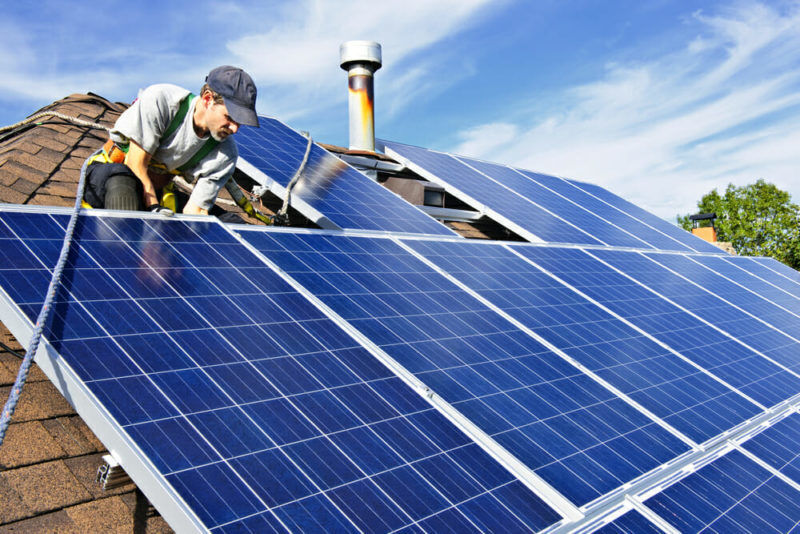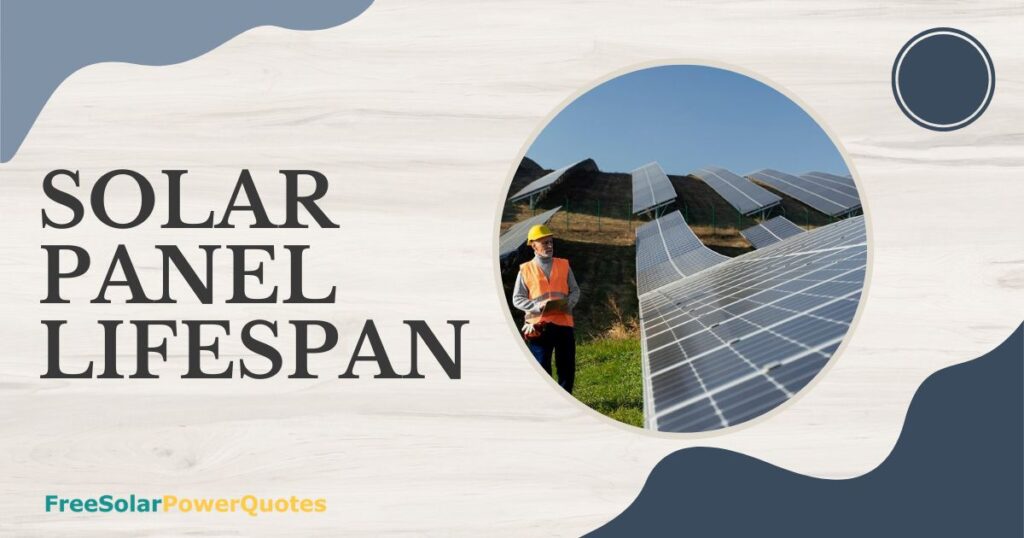The utilization of solar panels to produce electricity has gained significant popularity in recent times. Not only do they offer a clean, renewable energy source, but they can also save homeowners money on their energy bills. But how long can you expect your solar panels to last? Now, in this article, we’ll discuss about solar panel lifespan, the various factors that can influence their lifespan, and the measures you can take to maximize their durability.
What Is Solar Panel Lifespan?
The lifespan of a solar panel refers to how long it can continue to produce electricity at a reasonable efficiency level. Solar panels are typically warranted to last for 25 years, but they can often last much longer than that. In fact, many solar panels have been known to continue producing electricity for 30 years or more.
Factors That Affect Solar Panel Lifespan
Several variables affect how long a solar panel lasts, including:
Quality of Materials
The quality of the materials used in the construction of a solar panel can have a significant impact on its lifespan. Higher-quality materials are generally more durable and can withstand harsh weather conditions, extending the panel’s lifespan.
Environmental Factors
The environment in which a solar panel is installed can also impact its lifespan. For example, panels installed in areas with high levels of pollution or extreme weather conditions may degrade more quickly than those installed in more mild environments.
Maintenance
Performing routine maintenance can increase the longevity of a solar panel. This can include cleaning the panels, replacing any damaged components, and ensuring that the panel is properly installed and positioned to receive maximum sunlight.
Installation Quality
The quality of the installation can also have an impact on the lifespan of a solar panel. Panels that are not installed properly may be more susceptible to damage from environmental factors or may not be able to produce as much electricity as they should.
Panel Type
The type of solar panel can also affect its lifespan. While all solar panels are designed to last for at least 25 years, some types may have a longer lifespan than others. For example, monocrystalline panels tend to have a longer lifespan than polycrystalline panels.
How Long Do Solar Panels Last?
As mentioned earlier, solar panels are typically warranted to last for 25 years. However, many solar panels can last much longer than that. The exact lifespan of a solar panel will depend on various factors, including the quality of the materials used, the environment in which it is installed, and the level of maintenance it receives.
As per the research carried out by the National Renewable Energy Laboratory (NREL), the typical lifespan of a solar panel is estimated to be 30 years. However, the study also found that many panels can continue to produce electricity at a reasonable efficiency level for up to 40 years or more.

How to Ensure Your Solar Panels Last as Long as Possible
Although several factors can influence the lifespan of a solar panel, you can take certain measures to prolong its longevity.
Choosing High-Quality Materials
Selecting solar panels crafted from premium quality materials is crucial while making a purchase. These panels may cost more upfront but will likely last longer and be more durable, saving you money in the long run.
Proper Installation
Make sure that your solar panels are installed properly by a qualified professional. This can help ensure the panels are positioned correctly to receive maximum sunlight and protected from environmental factors.
Regular Maintenance
Regular maintenance ensures that your solar panels last as long as possible. This can include cleaning the panels, inspecting them for damage, and replacing any components that are not functioning properly.
Monitoring Performance
It’s important to monitor the performance of your solar panels regularly to ensure that they function properly. You can track your energy production and compare it to your energy usage. If you notice a significant decrease in energy production, it may be a sign that your panels need to be inspected or maintained.
Protecting Against Environmental Factors
Solar panels are designed to withstand a variety of environmental factors, but there are steps that you can take to protect them further. For example, you may want to consider installing a hail guard or protective film to help prevent damage from hail or other debris.
Upgrading Inverters
Inverters are an important component of a solar panel system, and they typically have a shorter lifespan than the panels themselves. Upgrading your inverters periodically can help ensure your system functions properly and produces the maximum amount of energy possible.
Investing in a Monitoring System
A monitoring system can help you track your solar panels’ performance and identify any issues that may arise. This can be especially helpful for larger solar panel systems or homeowners who cannot regularly monitor their systems.
Conclusion
Solar panels can last for 25 years or more, but various factors can impact their lifespan. By choosing high-quality materials, installing your panels properly, performing regular maintenance, monitoring performance, protecting against environmental factors, upgrading inverters, and investing in a monitoring system, you can help to ensure that your solar panels last as long as possible.
It’s important to remember that solar panels are a long-term investment, and replacing them can be expensive. By taking the necessary steps to extend their lifespan, you can save money and reduce your carbon footprint for years to come.
FAQS
How long does a solar panel last?
Solar panels typically last for at least 25 years but can often continue producing electricity for 30 years or more.
What is the lifespan of a solar panel?
The lifespan of a solar panel refers to how long it can continue to produce electricity at a reasonable efficiency level. Most solar panels are warranted to last for 25 years.
What is the life expectancy of solar panels?
The duration for which solar panels can function effectively may differ based on factors like the materials’ quality, environmental conditions, and upkeep. However, many panels can continue to produce electricity at a reasonable efficiency level for up to 40 years or more.
How long can I expect my solar panels to last?
Several factors, such as the quality of materials used, environmental conditions, and upkeep, play a significant role in determining the lifespan of your solar panels. Your solar panels can last for 25 years or more with proper care and maintenance.
Do solar panels have a limited life?
Yes, solar panels do have a limited life. However, with proper care and maintenance, they can continue to produce electricity for up to 40 years or more.
Can solar panels last forever?
No, solar panels cannot last forever. However, they can last for a significant amount of time with proper care and maintenance.
How long do photovoltaic panels last?
Photovoltaic panels typically have a lifespan of around 25 years but can continue producing electricity for up to 30 years or more with proper maintenance and care.
What is the average lifespan of solar panels?
The average lifespan of solar panels is around 25 years, but with proper maintenance and care, they can continue producing electricity for up to 40 years or more.
Do solar panels have a lifespan?
Yes, solar panels have a limited lifespan, typically around 25 years, but they can continue to produce electricity for 30 years or more with proper maintenance and care.

